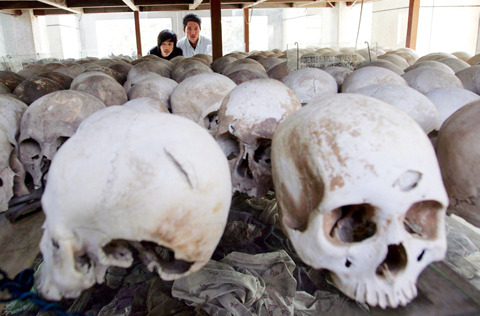A devoted math teacher before he turned revolutionary, Duch, the man who oversaw the Khmer Rouge’s security apparatus, begins his trial at Cambodia’s UN-backed war crimes court tomorrow.
“I have done very bad things in my life,” he confessed to journalists who tracked him down in 1999. “Now it is time for [the consequences] of my actions.”
The 66-year-old Duch, whose real name is Kaing Guek Eav, allegedly oversaw the torture and extermination of more than 12,000 men, women and children at the Khmer Rouge’s Tuol Sleng prison during the regime’s 1975 to 1979 rule.

PHOTO: EPA
Duch was formally arrested by Cambodia’s genocide tribunal in July 2007, becoming the first top Khmer Rouge cadre to be detained, and is charged with war crimes, crimes against humanity, torture and premeditated murder.
He is said to have been feared by nearly everyone who worked under him at the prison in the Cambodian capital Phnom Penh.
Most who worked there were uneducated teenage boys, who he said could be easily indoctrinated because they were “like a blank piece of paper.”
He has recognized the crimes committed under his command of the regime’s killing machine, where prisoners were tortured into denouncing themselves and others as agents of the CIA, KGB and Vietnamese Communist Party.
Duch was first arrested in 1999 after photojournalist Nic Dunlop uncovered him earlier that year working for a Christian relief agency in western Cambodia.
Before that, he was long thought dead following his disappearance after Vietnam’s ouster of the Khmer Rouge in 1979.
Instead, Duch had converted to Christianity and worked for relief organizations along the Cambodian-Thai border.
“I wanted to be a good communist; I did not take any pleasure in my work,” he told Dunlop. “All the confessions of the prisoners. I worried, ‘Is that true or not?’”
Duch later told tribunal investigators he believed the inner circle of Khmer Rouge leaders did not believe the confessions either, but used them as “excuses to eliminate those who represented obstacles.”
Born in 1942 in central Cambodia, Duch was a top student and is remembered as a sincere teacher devoted to helping the poor before he fled to the Khmer Rouge in 1970 as a reaction to injustice in then-volatile Cambodia.
That decision to join the communist guerrilla movement was influenced by one of his high school instructors who would later be executed at Tuol Sleng.
“I joined the Khmer Rouge in order to liberate my people and not commit crimes,” Duch told tribunal investigators. “I became both an actor in criminal acts and also a hostage of the regime.”

‘TERRORIST ATTACK’: The convoy of Brigadier General Hamdi Shukri resulted in the ‘martyrdom of five of our armed forces,’ the Presidential Leadership Council said A blast targeting the convoy of a Saudi Arabian-backed armed group killed five in Yemen’s southern city of Aden and injured the commander of the government-allied unit, officials said on Wednesday. “The treacherous terrorist attack targeting the convoy of Brigadier General Hamdi Shukri, commander of the Second Giants Brigade, resulted in the martyrdom of five of our armed forces heroes and the injury of three others,” Yemen’s Saudi Arabia-backed Presidential Leadership Council said in a statement published by Yemeni news agency Saba. A security source told reporters that a car bomb on the side of the road in the Ja’awla area in

PRECARIOUS RELATIONS: Commentators in Saudi Arabia accuse the UAE of growing too bold, backing forces at odds with Saudi interests in various conflicts A Saudi Arabian media campaign targeting the United Arab Emirates (UAE) has deepened the Gulf’s worst row in years, stoking fears of a damaging fall-out in the financial heart of the Middle East. Fiery accusations of rights abuses and betrayal have circulated for weeks in state-run and social media after a brief conflict in Yemen, where Saudi airstrikes quelled an offensive by UAE-backed separatists. The United Arab Emirates is “investing in chaos and supporting secessionists” from Libya to Yemen and the Horn of Africa, Saudi Arabia’s al-Ekhbariya TV charged in a report this week. Such invective has been unheard of

US President Donald Trump on Saturday warned Canada that if it concludes a trade deal with China, he would impose a 100 percent tariff on all goods coming over the border. Relations between the US and its northern neighbor have been rocky since Trump returned to the White House a year ago, with spats over trade and Canadian Prime Minister Mark Carney decrying a “rupture” in the US-led global order. During a visit to Beijing earlier this month, Carney hailed a “new strategic partnership” with China that resulted in a “preliminary, but landmark trade agreement” to reduce tariffs — but

SCAM CLAMPDOWN: About 130 South Korean scam suspects have been sent home since October last year, and 60 more are still waiting for repatriation Dozens of South Koreans allegedly involved in online scams in Cambodia were yesterday returned to South Korea to face investigations in what was the largest group repatriation of Korean criminal suspects from abroad. The 73 South Korean suspects allegedly scammed fellow Koreans out of 48.6 billion won (US$33 million), South Korea said. Upon arrival in South Korea’s Incheon International Airport aboard a chartered plane, the suspects — 65 men and eight women — were sent to police stations. Local TV footage showed the suspects, in handcuffs and wearing masks, being escorted by police officers and boarding buses. They were among about 260 South